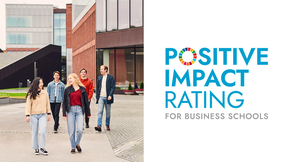Business students have a positive attitude towards sustainable development
According to researchers, awareness of students’ values and attitudes is crucial for the development of teaching.

The School of Business launches the Positive Impact Rating (PIR), a rating made by the school’s students, giving the students the chance to evaluate their school on how it is solving societal and sustainability challenges.
The collection of data is being organised by the Association of the students of Aalto University School of Business KY and Aalto Sustainable Business Club, who will distribute the survey to the students and communicate about the excellent possibility to make an impact. Students take responsibility for assessing the positive impact of their own school, providing a unique opportunity for the student voice to be heard.
‘In the 21st century, environmental and societal issues are becoming ever more important, and you can see growing interest towards these subjects also among students. Many business students want to have an effect on our future and be part of the positive change in the world. It is crucial that university studies offer the right tools to tackle these complicated problems. Therefore, I’m happy that business students are offered such a concrete way to evaluate our school’s impact on societal and sustainability challenges,’ says Saramaria Ritala, who is responsible for communications, brand, digital, and sustainability issues at KY.
Also the Dean of the School of Business Timo Korkeamäki values the opportunity to hear the students’ feedback.
‘The PIR survey gives our students a great opportunity to voice their opinion on how we succeed in addressing issues related to sustainability. I look forward to receiving students’ feedback on this very important topic.’
The rating survey asks students 20 questions in seven relevant impact dimensions that sit within three areas: Energizing, Educating and Engaging. Business schools are then provided with a defined social impact and a tool that they can use for change.
The overall PIR score of the business school is used to position the school on one of five levels. The different levels refer to the developmental stage of the business school, rating it by a certain level of achievement.
Katrin Muff, President of the Positive Impact Rating Association, said: ‘PIR is designed as a tool to improve and transform business education. It enables schools to understand what a positive impact for society is, according to their students. The PIR highlights the potential for improvement, even for leading schools.’
The PIR was created by concerned business school experts together with global NGOs – World Wildlife Fund WWF, Oxfam, and United Nations Global Compact. International student associations oikos, AIESEC and Net Impact are also part of the PIR, which is supported by VIVA Idea and Fehr Advice.
The results of the 2021 Edition of the Positive Impact Rating will be launched at the World Economic Forum in Lucerne-Burgenstock, Switzerland in May 2021.
More information on the rating: www.positiveimpactrating.org

According to researchers, awareness of students’ values and attitudes is crucial for the development of teaching.
Our intention is to integrate sustainability and responsibility into all teaching and research and be Finland’s leading sustainable university campus in 2020. In practice, sustainable development means sustainable use of energy and natural resources and a human-centric living environment, among other things.



